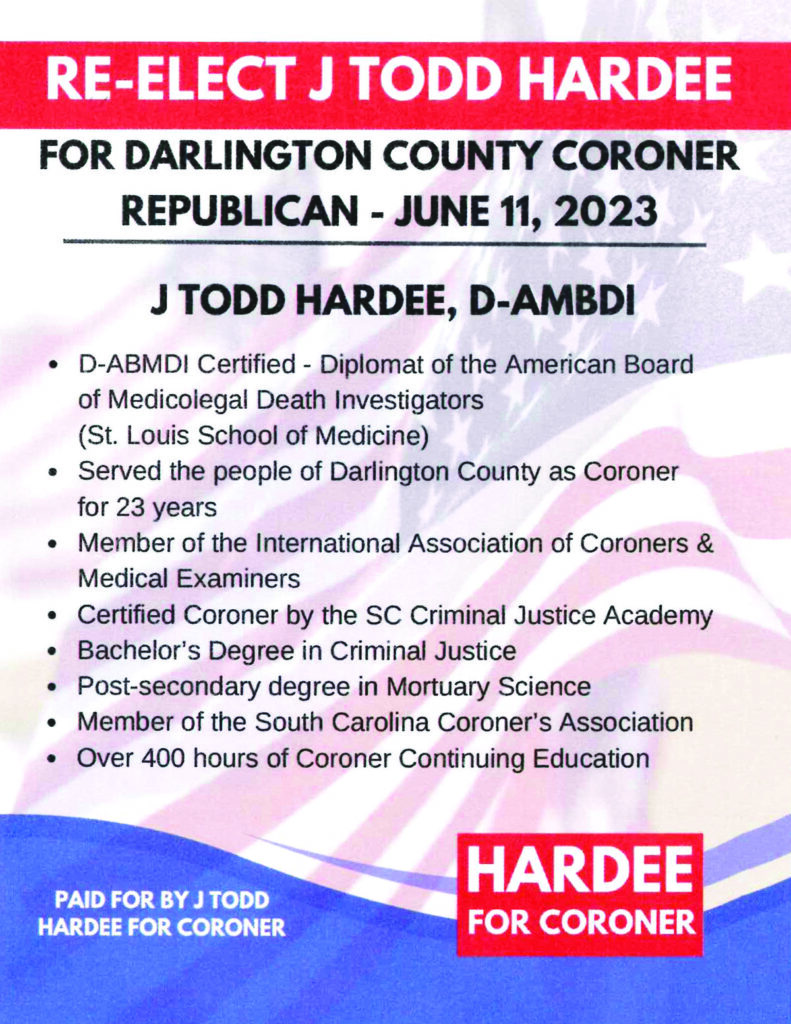DCIS, community agencies form Pre-Judicial Truancy Council to keep students in school


Members of the Darlington County Intervention School Pre-Judicial Truancy Council gather for a photo in the city of Darlington’s municipal courtroom. Pictured are (front row from left) Courtney Phillips, S.C. Department of Juvenile Justice; Lt. Kimberly Nelson, Darlington Police Department; Cyndie Geries, DCIS volunteer; William B Rogers Jr., Fourth Circuit solicitor; (back row from left) Denise Kelly, Rubicon Counseling Services; Dr. Bill Boyd, associate superintendent of Darlington County School District; Fondtrice McCormick, DCIS social worker; Julia Peterson, DCSD attendance supervisor; Dr. Zenobia Edwards, director of DCIS.
In collaboration with several community agencies and organizations, Darlington County Intervention School (DCIS) is working on a new initiative to keep students out of the courtroom and get them back in the classroom.
The Pre-Judicial Truancy Council is comprised of representatives from DCIS, Darlington County School District (DCSD), the Fourth Circuit Solicitor’s Office, Darlington Police Department, Rubicon Counseling Services, S.C. Department of Juvenile Justice and other volunteers. The council’s goal is to intervene in cases involving students who are not attending school, develop a comprehensive plan of action to get the student back in school, and avoid situations where students face judicial action.
“With this program, we are being proactive,” said DCSD Superintendent Dr. Eddie Ingram. “The bottom line is we’re trying to keep kids in schools. Never before has there been a venue where we all can get in the same place to make it happen. In the past, issues get bounced around from organization to organization. This is more effective and more impactful.”
South Carolina state law, with a few exceptions, requires all children to attend school, or their parents and guardians as well as the children can be subjected to legal consequences for truancy. Also, according to the state’s Proviso 117.36 Alternative Commitment to Truancy, a public school district with an alternative school must have a plan in place that attempts to help truant students avoid the legal system.
DCIS Director Dr. Zenobia Edwards thinks the Pre-Judicial Truancy Council will help students, parents, guardians and the school to do just that. The program is being tested at DCIS given the school serves the entire district.
“I am very glad that we now have an attendance initiative in place that preempts judicial action,” Edwards said. “There is a strong correlation between academic achievement and attendance. You can’t learn what is necessary for success if you’re not present where the information is being taught. It helps to have all voices in one room to discuss individual student situations to build a more realistic plan for improved student attendance.”
The council summons truant students and their parents or guardians to the city of Darlington’s municipal courtroom. They sit down together with representatives of all of the agencies. All sides are given the opportunity to explain their positions, which helps the council determine the underlying reason or reasons a student is not attending school. With so many resources available at once, the council intends to generate pragmatic solutions and help the student get back in school.
Fourth Judicial Circuit Solicitor William B. Rogers Jr. hopes his involvement in the council will help alert families to the seriousness of truancy.
“The more you can keep kids in school, the more they have the chance to succeed and become productive citizens,” Rogers said. “If we lose them in the process and they leave schools, then we’re not helping their chances of success. If I had my way, we wouldn’t get any attendance referrals. This pre-judicial program should help with that. We want to provide anything our office can do to help keep the kids in school.”
The school district’s head social worker, Sue Cataen-Ingram, brought the idea for the Pre-Judicial Truancy Council from a North Carolina school district in which she worked previously. During the past two years, DCIS and district administrators, including Attendance Supervisor Julia Peterson and Social Worker Fondtrice McCormick, developed the idea to best fit the district and the community.
“Often times, when truant students and parents are subjected to judicial intervention, we do not get to the root of the problem,” Cataen-Ingram said. “Court is too large of a setting, and we miss the opportunity to get through the barriers to understand poor attendance. I am thrilled that Dr. Edwards moved forward with this program. I hope we can eventually use it across Darlington County.”
Darlington County School District is a countywide district, serving more than 10,400 students in 23 schools and Darlington County Adult Education. For more information about this program or other programs in the district, please visit darlington.k12.sc.us.


